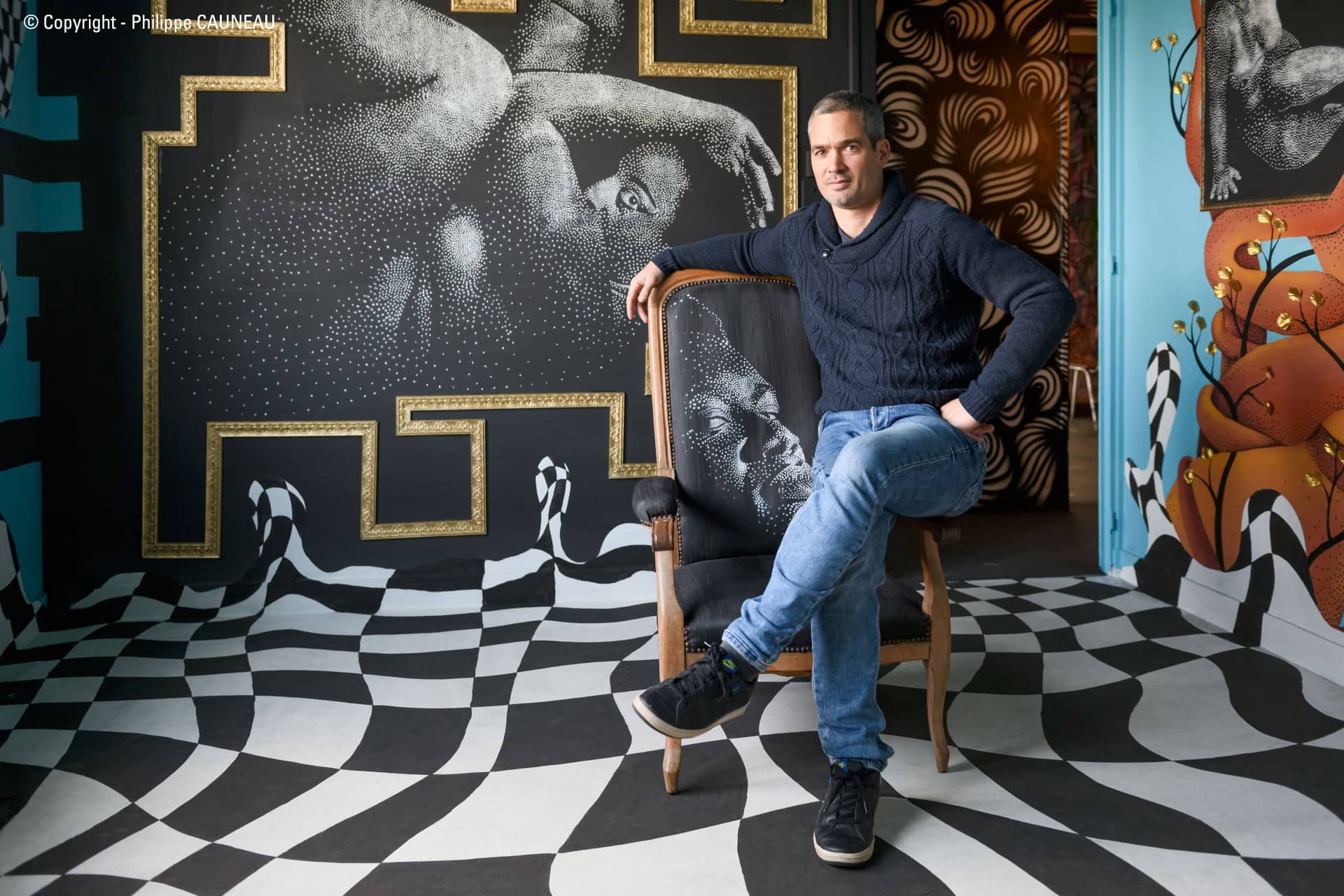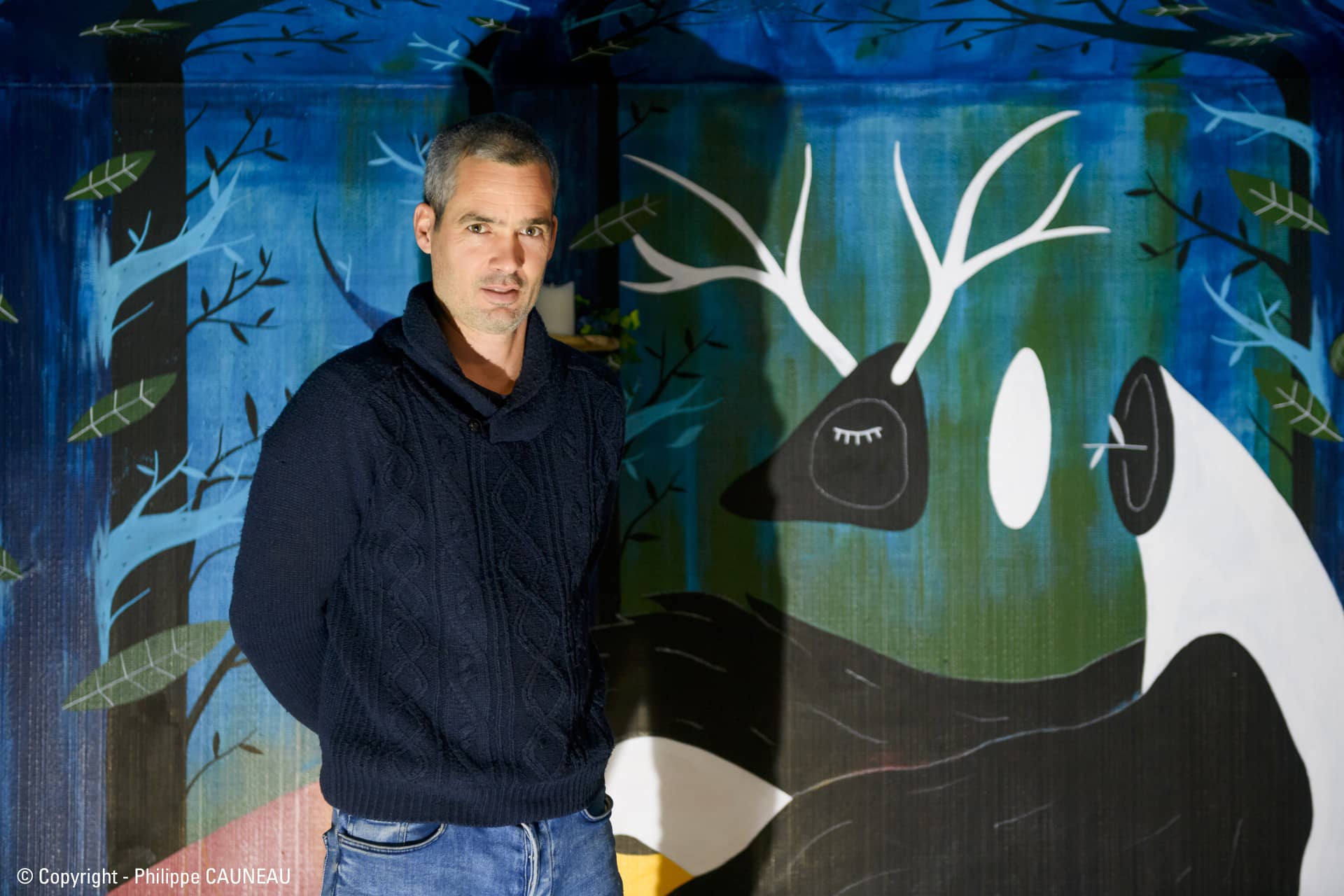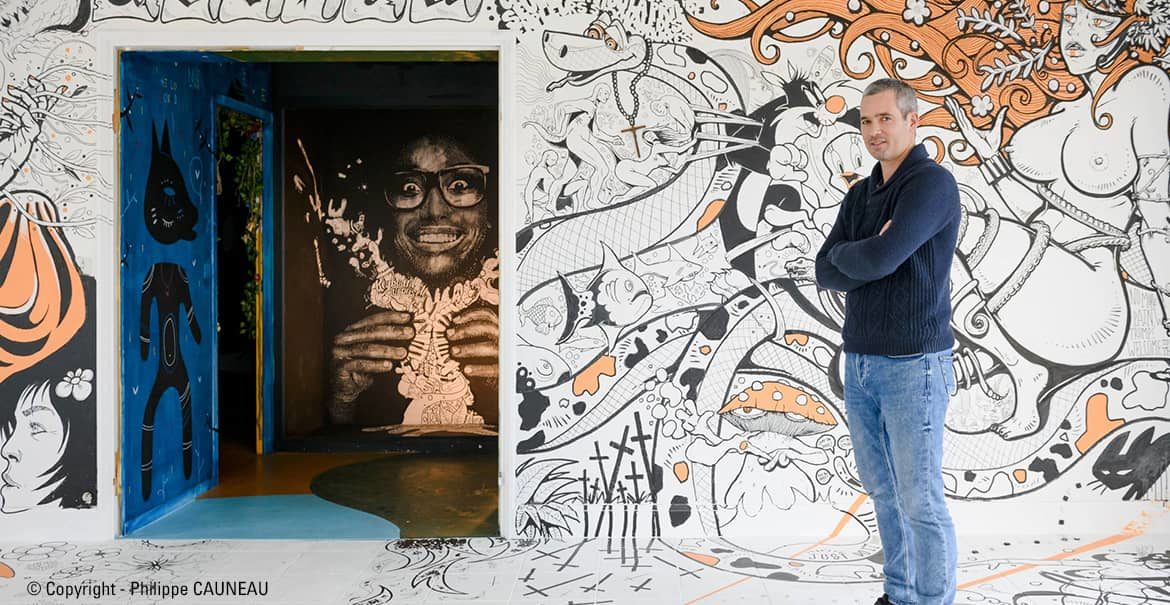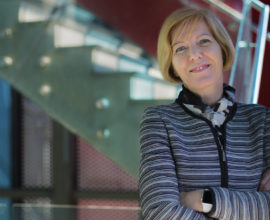Boris Couilleau
Pioneering democratic and inclusive business practices
![]() Reading Time: 9 minutes
Reading Time: 9 minutes
Social entrepreneur, Founder & CEO of Titi Floris, Hacoopa & La Fraterne
Interview conducted in 2022. Boris Couilleau is still CEO of SCOP Titi Floris in Nantes.
Boris Couilleau’s first years after graduation were not plain sailing: within half a decade, he’d experienced the consequences of a ruinous investment, a series of jobs with little meaning, the premature birth of his twins, and the stress of working under an abusive boss. But Boris managed to come out of it stronger and finally in tune with his true aspirations. A beautifully coherent career ensued, driven by the desire to facilitate the daily life of vulnerable citizens and to pioneer democratic business practices.
In 2006, he launched Titi Floris, a transport company for people with reduced mobility. The group is in constant expansion and now counts 1,500 employees across the western region of France. Titi Floris has set the standard for virtuous businesses, striving to integrate the world of disabled people with the rest of society. Boris then launched Titi Services, a subsidiary offering personal support services for vulnerable users, currently with 80 employees and a healthy 1.7 million euro turnover. His latest ventures include La Fraterne – an inclusive restaurant that employs disabled people and encourages dialogue, and Hacoopa, an innovative, shared housing concept for seniors.
Boris has chosen the SCOP (social and participatory cooperative) model for all of his companies. With its member ownership structure and community focus, it gives employees a skin in the game and it fosters outcomes that support the group.
Boris tells us more about what led him to run one of western France’s most successful cooperative groups. But he also insists on giving us a reality check: “It’s not all sunshine and rainbows every day!”
Is being an entrepreneur in your genes?
I certainly come from a family of entrepreneurs, with roots in a rural region not far from Nantes. My grandfather owned a freight-transport company, my grandmother was a wedding caterer and my mother owned an outlet shop. As for my dad, he was responsible for a small management centre. He’s always had a passion for numbers, and all his life he has made his accounting skills available, pro bono, to his father’s company and to various sporting associations. Today at 68, he still is involved in Titi, volunteering as our chartered accountant… probably too involved actually! Oh, the joys of mixing family and business! (laughs)
So you could say that a trading and entrepreneurial culture runs in the family. Working hard and long hours was the norm. I grew up without ever seeing my dad in the evenings.
What were you like as a child?
I was a restless child. I remember going to school to have fun and I loved clowning around. I performed well academically, but respecting the rules was not my priority, I had no boundaries and I often ended up punished and almost being expelled.
Were you still that unruly during your Audencia years?
Oddly enough, my experience at Audencia was a comparatively tame experience. I was living with my girlfriend (who later became my wife) and contrary to most of my peers who were “uprooted”, I already had my habits and my friends in Nantes. I wasn’t that much involved in the school’s social life, but I liked the networking opportunities and the way the school was bringing the business world to us. I “binged” on internships and found roles that would allow me to explore several sectors at Société de Bourse and an IPO management firm.
On your LinkedIn profile, we noticed a gap between your graduation and the launch of your first company. Anything to hide?
It was a tumultuous time for me, but I don’t mind being transparent about it, because I came out wiser and stronger. In 2000-2001, at the peak of the dot-com bubble, I had invested all my savings, as well as some of my parents’, in the stock market. When it burst, I found myself with a huge debt – and even more so because I had used leveraged strategies. I dragged this burden for several years. I realise now that this failure is what led me to take a path that suited me much better. It also put me off market finance for life. I resented its volatility and I hated the principle of taking so much risk with so little control over it.
I then worked for financial consultancy firms for about 5 years, which allowed me to acquire solid financial, tech and management skills. However, I realised how much I craved more practical and meaningful projects.
What led you to start your own company at 28 years old?
It was a conjunction of factors really. In 2003, after the birth of my twin boys, I took two six-month breaks to look after them. I had time to reflect on my true aspirations. It was only then that I realised how frustrated I had been professionally. I was tired of the corporate codes and I couldn’t visualise a space where I could be fulfilled. So I decided to create my own. I came up with several start up ideas during my extended paternity leave – two of which I ended up developing more than 15 years later: an inclusive restaurant employing special needs workers and an innovative cohousing concept for senior citizens.

Your career seems very consistent, as all your projects support vulnerable users. Are there any personal reasons that explain why you decided to work in this sector?
Contrary to what people might assume, I am not someone who particularly stands out for his empathy – unlike my wife, for example. I first landed in the personal assistance sector by accident: in 2005, a transport company for people with reduced mobility recruited me. At last, I was feeling socially useful and I immediately felt comfortable in this sector. However, there were leadership issues: the director’s toxic behaviour made life miserable for the whole team. I knew that the company wouldn’t go far so I left after 6 months.
I then went about launching a competing service because of the low entry barriers. It took me four months to set up the company; I obtained a passenger transport diploma, bought three vehicles and launched the business with a personal start-up capital of 8,000 euros.
I suppose I can trace my choice back to the traumatic arrival of my twin boys, who were born very prematurely at 6½ months. They came close to growing up with multiple disabilities and for the first time I was confronted with the reality of parents who raise disabled children.
Why did you choose the “SCOP” as a legal structure?
I’m definitely not a political activist, but my previous experiences made me realise that the corporate model where ownership is in the hands of a couple of guys or an external pension fund, totally dehumanises the work. I wanted to go for a different sort of entrepreneurship, where employees could become shareholders and associates; and, in my own way, transform the hyper capitalistic system. The SCOP status -a cooperative and participatory company- was exactly what I was after. It guarantees a long-term ethical basis for business practice. This status helps attract people with similar values. It also serves to create a vision and can boost the success of a project, because it meets the aspirations of employees and customers alike.
This model seems to make sense on so many levels. How do you explain that it’s not more developed?
Anyone who is serious about launching their own company devotes a huge amount of their time, energy and soul to it. It is totally legitimate for founders to expect some form of financial reward, especially as we live in a society where money is omnipresent. And it’s not that common for entrepreneurs to choose the common good as their primary objective. Most start-up founders are also driven by the engrained and largely mythical prospect of ultimately exiting with a jackpot. As the founder of a cooperative, I know that a jackpot is not technically -let alone morally- possible. A SCOP also requires much more transparency, which is something you have to be prepared for. Lastly, with a single shareholder, the internal dynamics are binary; if there are any fundamental disagreements, employees either lie low or quit. With a SCOP, however, the decision process is democratic (one person one vote), and requires a lot of effort, listening and compromise. It can be tiring and even hurtful when relationships are not as harmonious as hoped for. So it’s not all rosy, and each year we have a few outbursts and meltdowns, with colleagues who don’t get on. Nevertheless, this is unavoidable between human beings and overall, we are very fortunate that Titi operates smoothly and healthily. And, I have just been re-elected to the board. Phew!
You are a fierce advocate for growth. Isn’t this a risky way to manage a cooperative?
I see no contradiction in having growth ambitions for our SCOPs. We are a bit restricted in the ways we can use our capital and have the obligation to redistribute a lot of it. But this is where my entrepreneurial vision and personal touch come into play. I like to bring ideas for new projects to launch or to integrate. They are often complex, but I am persistent. This question comes back every year: do we lose our identity if we grow? Our expansion strategy is to recreate a local entity in each region. This way each entity is anchored locally with a strong sense of belonging. All employees benefit from the economy of scale and the protection that the parent company offers. I am convinced that this approach actually mitigates risk.
Is there a recent project that you are particularly proud of?
That would be the new SCOP we are working on, for sure! For many elderly people living alone, the social isolation can lead to a serious decline in physical and mental health. There are a lack of housing options for this population. When they lose their autonomy, the elderly either move to an expensive serviced residence, or, more frequently, to a large and impersonal nursing home. I dreamed up Hacoopa, a smaller scale shared living space that people can move into before they become too dependent. A coordinator will be on site for a couple of hours each day to bring some social cohesion and deal with logistics.
The first building near Nantes should welcome its first residents in 2022. Back in 2020, before starting the building work, we organised a street art exhibition on site. We invited a group of talented street artists to paint the inside walls and the event has sparked people’s curiosity and created a buzz around the project. It was amazing*. I believe in this housing concept so much that the plan is to build a popular movement around this, and develop a whole network of similar homes in the west of France.
*Note from the Audencia team: this is the venue where we organised the photoshoot with Boris. The artwork he mentions is visible in the background of the photos in this article!

Do you manage to find the time to stay close to the activity on the ground?
This year has been different because of covid, but usually I do. We constantly have to go through tendering processes, and I am still in charge of the commercial activity. Occasionally, I take the time to be at the school gates. Greeting the school head teachers with whom I set up the service, chatting with the drivers and watching the children boarding the vehicles always feels special.
Do you often reflect on the impact that you are making through your multiple ventures?
It’s always heart-warming to be reminded of the difference we are making in people’s lives. Thank you! But frankly, most of the time, I find myself facing the stressful flow of everyday business bumps so, unfortunately, I often miss the gratifying aspect of the activity.
How do you unwind from all of this?
I relax easily when I am around my wife and my four kids, but my mind is always switched on in the background …and so is my work phone! For the first 9 years, I was on call 24/7, and now, fortunately, we rotate. Drivers call if they have an accident in the middle of the night, or fall ill and can’t do a job. The callers are sometimes surprised to hear the “the big boss” picking up! The launch of La Fraterne last summer, with its guinguette and live concerts, was a good excuse to spend many evenings out and let some steam off, even if it wasn’t ideal for my sleeping regime!
Looking ahead, what are your long-term career plans?
Social businesses need to operate in the long term to trigger deep changes; we need to plan for longer lifespans. I am also aware of the importance of preserving my colleagues’ health as well as mine. Looking ahead, I would like to find myself in an environment with less pressure though. Yet at the same time, I love the stimulation that my leadership role provides. It has even equipped me to overcome challenging situations I faced in my personal life. Like everything, it’s matter of finding balance.
Maybe it’s the lockdown introspection effect, but I have recently started to project myself in a future where I am not heading up this company anymore. I know that I need to restructure it so the teams are less dependent on me. The plan is to continue to surround myself with the most talented staff, and for me to take some distance. No one is irreplaceable.

